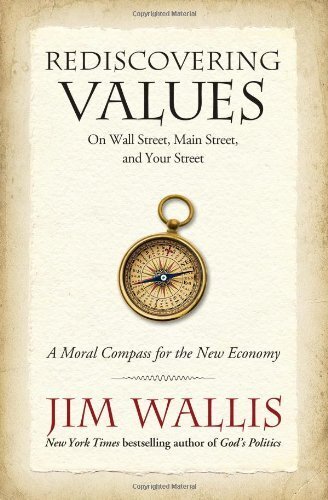Jim Wallis, Rediscovering Values On Wall Street, Main Street, and Your Street: A Moral Compass for the New Economy. Howard Books, 2010.
Referenced in:
- Jim Wallis on Social Ministry
- Theological and Sociological Foundations of Social Ministry
- Giving and Financial Stewardship – Christian Social Conscience Regarding Possessions
LifeandLeadership.com Summary
Jim Wallis is one of the most heeded social prophets of our time. Many who are familiar with his writings believe this is one of his most personal and passionate calls to Christian social conscience. Others who have not read Wallis may encounter this as a good introduction to his thinking.
The book is divided into seven parts and seventeen chapters. The opening sections challenge our idolatry to the “Market God,” tracing the greed, self-indulgence, and demand for immediate self-gratification of various sectors of society which lead to the current economic recession. Wallis suggests these times may actually be an opportunity to reaffirm important Christian values. As solutions, he presents discussions on setting limits on tendencies toward accumulation, renewing a sense of social accountability and shared economic responsibility, and learning from the Native American philosophy of considering how our decisions will affect the next seven generations. He also discusses adopting clean energy practices, reaffirming the importance of family, and emphasizing the value of work and service. Part Seven is an excellent piece, listing “Twenty Moral Exercises.” This includes ideas such as seeing calendars and budgets as moral documents, valuing family and neighbors, welcoming strangers, joining social justice campaigns, etc.
Any church leader wants to lead self and others into becoming better stewards will welcome Wallis’ insights, especially as a tool to help believers affirm Christian values in the new economy. Many will want to balance his perspective with others listed in the resource guide on Theological and Sociological Foundations of Social Ministry.
From the Publisher
THE RIGHT QUESTION
WHEN WE START with the wrong question, no matter how good an answer we get, it won’t give us the results we want. Rather than joining the throngs who are asking, When will this economic crisis be over? Jim Wallis says the right question to ask is How will this crisis change us?
The worst thing we can do now, Wallis tells us, is to go back to normal. Normal is what got us into this situation. We need a new normal, and this economic crisis is an invitation to discover what that means. Some of the principles Wallis unpacks for our new normal are…
- Spending money we don’t have for things we don’t need is a bad foundation for an economy or a family.
- It’s time to stop keeping up with the Joneses and start making sure the Joneses are okay.
- The values of commercials and billboards are not the things we want to teach our children.
- Care for the poor is not just a moral duty but is critical for the common good.
- A healthy society is a balanced society in which markets, the government, and our communities all play a role.
- The operating principle of God’s economy says that there is enough if we share it.
- And much, much more…
In the pages of this book, Wallis provides us with a moral compass for this new economy — one that will guide us on Wall Street, Main Street, and Your Street.
About the Author
Jim Wallis is a bestselling author, public theologian, speaker, preacher, and international commentator on religion, public life, faith, and politics. He is president and CEO of Sojourners, where he is editor-in-chief of Sojourners magazine. He regularly appears on radio and television, including shows like Meet the Press, the Daily Show with Jon Stewart, the O’Reilly Factor, and is a frequent guest on the news programs of CBS, NBC, ABC, CNN, MSNBC, Fox, and National Public Radio. He has taught at Harvard’s Divinity School and Kennedy School of Government on Faith, Politics, and Society. He has written eight books, including: Faith Works, The Soul of Politics, Who Speaks for God? and The Call to Conversion.
***For additional information on this resource, including reviews, click the bookstore links. Check the reference at page top or the links below for resource guides on related topics.***
Related Areas
See Other Resource Guides on Christian Social Ministry:
- Theological and Philosophical Foundations of Social Ministry
- Spirituality for Ministry of Social Compassion and Justice
- Strategies For Christian Social Ministry
- Perspectives and Strategies For Social Ministry Among the Urban Poor, Urban Ministry
- Christian Perspectives on Political Theory and Church-State Relations
- Christian Perspectives on Economics and Public Policy


